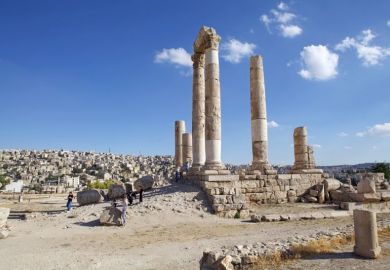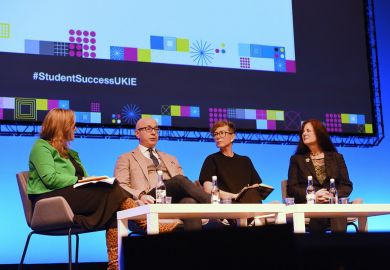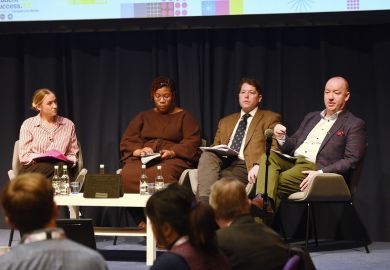While the merits of STEM-based teaching and learning were widely lauded during last year’s vaccine race, the value of a liberal arts education also became a pivotal discussion within global higher education as instructors and students alike turned to humanities-based subjects in search of relief from and solutions to the unprecedented pandemic crisis. No longer confined to the halls of ivy-covered American colleges, this multidisciplinary approach, which focuses on developing creative thinking skills, has begun to transform the curricula of institutions worldwide, and will be the focus of the virtual Times Higher Education MENA (Middle East and North Africa) Universities Summit, co-hosted with NYU Abu Dhabi, on 6-8 April 2021.
John Gill, editor of THE, said: “As we enter the next phase of the Covid-19 pandemic, with a challenging but clear exit strategy ahead of us, we find ourselves at a crucial moment for the world on numerous fronts – from how to respond to pre-existing global threats, such as climate change, to navigating a path to greater understanding and collaboration. Higher education and research have played – and will continue to play – crucial roles in finding the answers. At this summit, we will convene online to discuss the role of liberal arts education, at a time of debate about how best to prepare students for the new economy, and how to support societies in transition.”
Fostering discussions on how to prepare students for a variety of career paths after graduation is high on the list of the three-day summit’s objectives. In the event’s first formal discussion, Mariët Westermann, vice-chancellor of NYU Abu Dhabi, will provide insights on utilising a liberal arts education as a professional launchpad. She said: “Education is the key pathway to a diversified knowledge-based economy and to human flourishing. In an era of accelerating world challenges and rapid technological change, most university graduates must be prepared not only for their first jobs and the opportunities of today’s workforce, but also to adapt and keep learning over their lifetimes. How will universities respond to these realities? In the MENA region, how will systems of higher education grow and diversify to meet the needs and potentials of a huge youth population?”
The summit will also feature an exclusive data masterclass, conducted by Duncan Ross, THE’s chief data officer, orientated on trends and predictions for the new Arab University Rankings, which will open for submissions in July.
Wasif Rizv, founding president of Habib University, Pakistan’s first liberal arts and science institution, will discuss an instructional model from south-east Asia to demonstrate how a liberal arts education can develop talent to meet the demands of a global workforce. Hoda Mostafa, director of the Centre for Learning and Teaching at the American University in Cairo, will share useful practices to facilitate the leap between an interdisciplinary education and careers both in and outside academia. Marta Losada, dean of science and professor of physics at NYU Abu Dhabi, will lead a conversation on universities’ potential for impact in bolstering their local communities, with contributions from Hussain Al Hammadi, minister of education of the United Arab Emirates government, and Silvia Serrano, vice-chancellor of Sorbonne University Abu Dhabi.
Another key focus will be enhancing the research culture in countries where talent attraction has faced challenges. Rana Dajani, associate professor at Hashemite University, who established the field of stem cell research ethics law in Jordan, will discuss with other panellists which tools are needed to support the next generation of researchers in the MENA region. In the following session, Carol Bellamy, chair of the board of directors of the Global Community Engagement and Resilience Fund, will discuss the benefits and drawbacks of online learning, and how ultimately to ensure that it is equitable in its delivery, particularly for those situated in more remote areas.
Safwan Masri, the current vice-president for global centres and global development at Columbia University, who has written extensively on the role of Tunisia in the Arab Spring, will deliver the summit’s closing keynote, underlining the power of research and knowledge transfer in the region to promote a greater cultural understanding and to bridge political boundaries.
Dr Westermann said: “At this summit, leaders in higher education, government and industry from the region and beyond will present fresh ideas and discuss how research and curricula in all disciplines can work together to develop human potential while translating curiosity and ideas into solutions and applications for the good of our world.”
Mr Gill concluded: “We will consider how a global perspective can transform the impact of education, and address the interplay between education and research in the MENA region. These topics touch on every aspect of what universities do, as institutions that educate, create new knowledge and drive economic and social progress, so we are delighted to have such a diverse programme of speakers, and to be collaborating with our partners at NYU Abu Dhabi, itself a great example of innovation.”
Click here to register for the virtual Times Higher Education MENA Universities Summit 2021.
Register to continue
Why register?
- Registration is free and only takes a moment
- Once registered, you can read 3 articles a month
- Sign up for our newsletter
Subscribe
Or subscribe for unlimited access to:
- Unlimited access to news, views, insights & reviews
- Digital editions
- Digital access to THE’s university and college rankings analysis
Already registered or a current subscriber?




